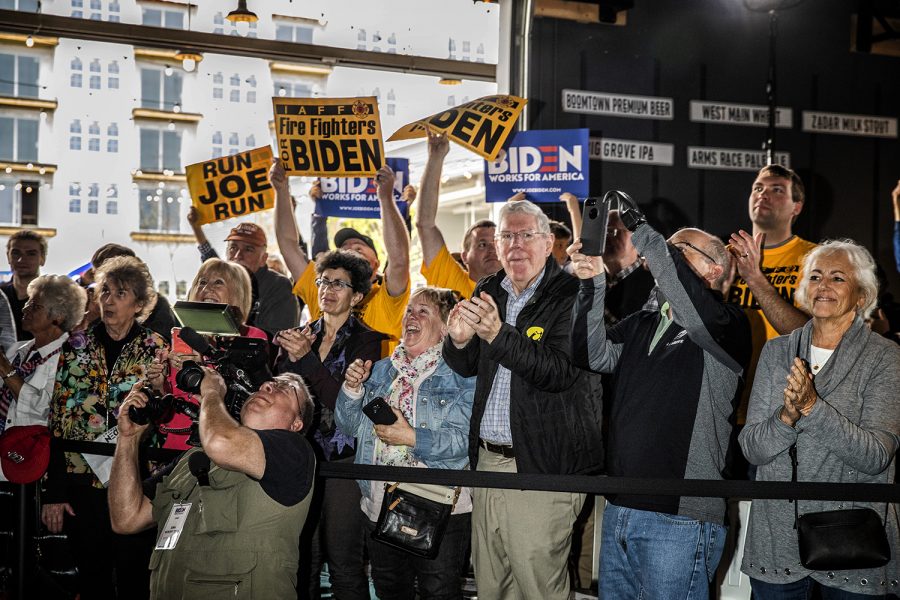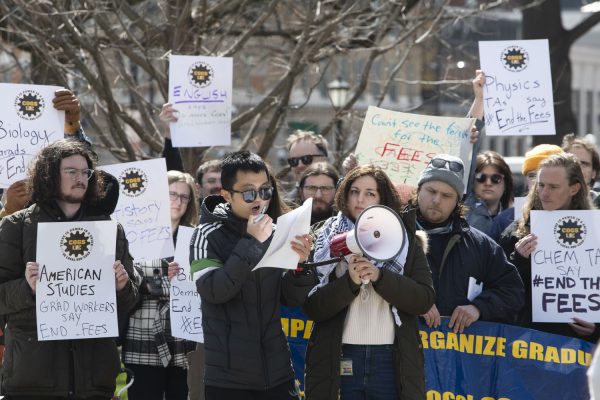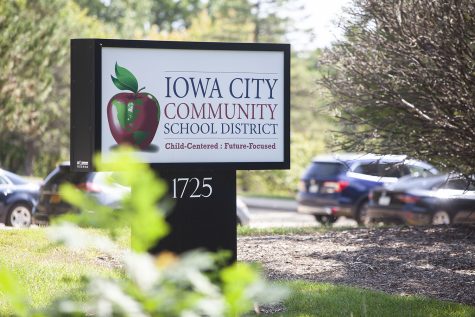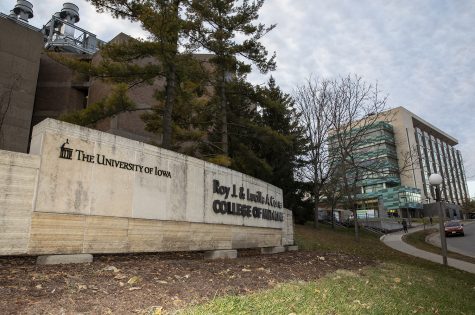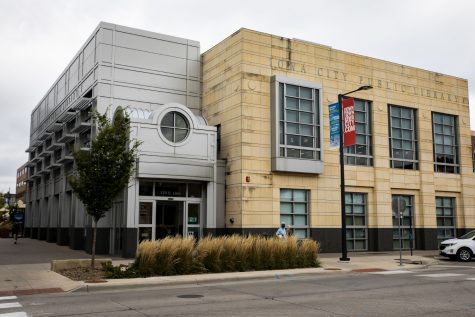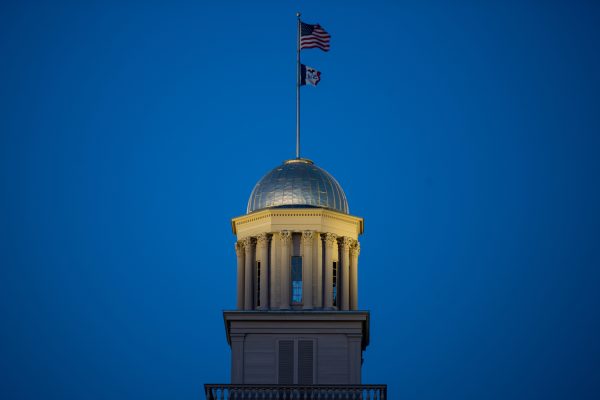Guest Opinion: An erstwhile Iowan’s view from Nevada
UI Professor Emerita Judy Polumbaum writes on the platforms of Democratic candidates going into the primary elections.
Attendees cheer for Former Vice President and 2020 Democratic Presidential candidate Joe Biden at Big Grove Brewery in Iowa City on Wednesday, May 1, 2019. Iowa City was the second stop on the Iowa Kickoff Tour for the Biden campaign.
May 2, 2019
With each addition to the sprawling field of Democratic presidential contenders, Nevada gains must-visit attention. Six of the Democratic candidates were in the magnet city of Las Vegas on April 27 to speak to a gathering of union activists and community organizers.
A Planned Parenthood staffer in attendance compared the occasion to speed dating — the hopefuls making early, flirtatious overtures to potential admirers seeking the ideal match for the presidential prom.
Nevada is third on the presidential-primary calendar, with caucuses convening on Feb. 22, 2020. These follow Iowa’s Feb. 3rd first-in-the-nation caucuses and New Hampshire’s Feb. 4th primary vote.
But Nevadans like to consider their state the true testing ground. All three states might be impugned as unreliable bellwethers, given their relatively small populations — New Hampshire with 1.5 million or so people, Iowa and Nevada each counting just more than 3 million. Yet Nevada can claim to better represent the nation as a whole, because Hispanics, Asians, African Americans, and other minorities constitute fully half the state’s populace, if not more, whereas minorities account for merely 8 percent in New Hampshire and about 13 percent of Iowans.
Nevada also has bragging rights to sensible weekend timing, with its caucuses scheduled on a Saturday. Iowans caucus on a Monday, while voters in New Hampshire and other primary states are saddled with the unwieldy Tuesday tradition.
The April 27 forum, co-sponsored by the Service Employees International Union (its presence and strength in Las Vegas evident in the plethora of purple SEIU T-shirts) and the Center for American Progress, drew a receptive audience of several hundred activists and organizers to a rented event venue on the city’s East Side.
The proceedings transpired from a stage hung with banners and framed by large video screens, two plush white sofa-chairs positioned in the middle. Former New York Times labor reporter Steven Greenhouse emceed, giving each candidate 20 minutes to make brief remarks and respond to questions. As Greenhouse stayed ensconced in his seat, every candidate in turn swiftly abandoned the sitting option to stand, roam, and gesticulate.
For this recent transplant from Iowa, the occasion offered useful glimpses of the candidates’ personas while illuminating local enthusiasm for progressive ideas. Although much of Nevada is rural and, like much of rural Iowa, of conservative bent, Clark County, in which Las Vegas is situated, has two-thirds of the state’s residents and thus outsized voting power. Thus did Democrat Jackie Rosen eject Republican Dean Heller from his Trump-blessed U.S. Senate seat in the midterm elections of November 2018. The governor’s office also turned over from red to blue, and Nevada’s state Legislature became the first with a female majority.
Herewith some impressions:
First up was former California Attorney General, now U.S. senator, Kamala Harris. As the only woman of color there, she could get away with saying “ain’t.” She frequently referred to the power of collective action and the merits of according even those of humble means their “dignity.” Whether by nature or design or both, she was relaxed and folksy. Meanwhile, the two national political reporters on either side of me — one there from D.C., the other from LA — commented about how her aides prep her to say exactly what she wants to say.
Then Amy Klobuchar, U.S. senator from Minnesota. I was waiting for Greenhouse to ask about her reported nastiness to staff, but he didn’t. She mentioned that her grandfather was an iron-ore miner, her father a journalist, her mother a teacher, and all three union members. She came across as wonky, the experienced pol who will attend conscientiously to her constituents.
Beto O’Rourke, who as a first-term Texas congressman narrowly lost his U.S. Senate race to incumbent Ted Cruz, was positively manic, words tumbling over each other and elbows akimbo. Carrying cadences of Obama, he offered high principles, including promises to close America’s socioeconomic and racial divides, but few specifics. He said he’d just come from the home of retired Democratic Sen. Harry Reid, powerhouse Senate majority leader through the Obama years, where they’d discussed the need to bring down health-care and drug costs.
Obama’s housing secretary and former San Antonio Mayor Julián Castro extended both lofty rhetoric and concrete proposals, his vision of “the smartest, the healthiest, the fairest, and the most prosperous nation on Earth” resting on executive actions, an ambitious legislative program, and incentives for states to better address inequities. His first executive order after bidding Trump adieu, he said, would be to recommit the U.S. to the Paris Climate Accord.
Castro was the only speaker to mention Native Americans, describing South Dakota’s Pine Ridge Reservation as the country’s deepest pocket of poverty. The day before, he said, he’d toured drainage tunnels beneath the Las Vegas Strip where communities of the homeless live.
Unlike O’Rourke and Castro, who wore dark suits and muted ties, John Hickenlooper appeared in a tan sports jacket with no tie. He greeted Greenhouse with a hug — as college students at Wesleyan University, the two had been soccer teammates. A former governor of Colorado and before that a geologist-turned-restaurateur, Hickenlooper touted his record of working successfully with business interests to promote “economic growth that benefits everyone.” The applause was tepid.
Not so for the final speaker, Elizabeth Warren, former Harvard law professor, consumer finance and bankruptcy expert, now U.S. senator from Massachusetts. She was the clear rock star, the finest, funniest performer of the lot, delivering punch lines with panache — “I’m tired of freeloading billionaires.” The crowd loved her.
In the end, all six candidates were in accord on many fundamentals: Tax reform to redistribute income from the richest to the middle classes, working people and the poor; huge boosts in funding for child care, student-loan forgiveness, infrastructure overhaul, job creation and training, affordable housing, and more.
They all called for universal health care (although only Harris and Klobuchar endorsed a single-payer “Medicare-for-all” system, with others favoring both private and public options at least for a transitional period). They all supported comprehensive immigration reform, with paths to citizenship for the law-abiding.
Speaking to this largely labor audience in a strong union town, all six proclaimed records as champions of organized labor. They advocated rolling back “right-to-work” laws that cripple union organizing and dues collection; extolled the “Fight-for-Fifteen” movement, which seeks a $15-per-hour federal minimum wage; and pledged to make labor-friendly appointees to the National Labor Relations Board.
Having heard from three impressive women and an impressive Hispanic man, I ruminated on suspicions that the media already had anointed three white guys as best bets in the Democratic horserace. National news organizations are assiduously tracking the two ostensible front-runners, Bernie Sanders and Joe Biden, who couldn’t make it to the forum, along with O’Rourke, who often comes up third in the polls.
The reporters on either side of me would follow Beto to California. They bantered about prospective running mates, wondering who could possibly play second-fiddle to Bernie.
In any case, I thought, all these people have to have tremendous egos. Nevertheless, at this point, they present us with a reasonable array of potential prom dates.
—Judy Polumbaum
Professor Emerita, University of Iowa School of Journalism and Mass Communication



